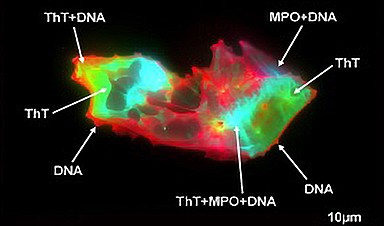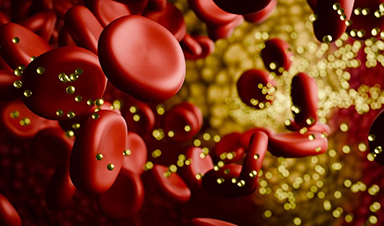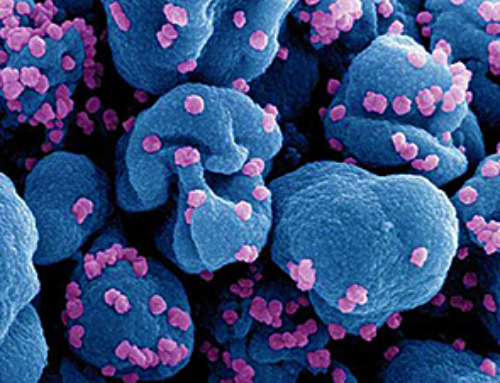| Would you like to help in some research on the regulation of what future AI-driven nanomedicines should look like? If so, researchers at the University of Bristol are looking for volunteers to discuss ethical and regulatory issues of using AI driven cancer therapies with swarm behaviour through a series of interviews. | |
| The research is part of the SWARM study – Small robots With collective behaviour as AI-driven cancer therapies; building Regulations for future nanoMedicines. | |
| The researchers are looking for: | |
|
|
| Volunteers must be over the age of 18 years old to take part. We would love to hear from you. You can find out more about the study on our SWARM study webpage or by contacting Matimba Swana at matimba.swana@bristol.ac.uk. | |
| If you would like to take part please complete this Expression of Interest Form. | |
About the SWARM study |
| Cancer occurs when abnormal cells divide in an uncontrolled way. Many cancers can be cured. But in some people cancer can return. Cancer drugs, such as chemotherapy, need to be able to kill all the cancer cells, but this means they can also kill healthy cells. | |
| Nanomedicine is the medical application of nanotechnology which works on tiny scales called ‘nanometres’ (one-billionth of a metre). Nanoparticles are nanosized particles that can assist the delivery of chemotherapy drugs to cancer cells. Scientists and Engineers can use simulations for selecting nanoparticles so drugs can more effectively reach the tumour while avoiding side effects. | |
| Nanoswarms | |
| Using simulations, scientists and engineers are working on adding swarm behaviour (present in social animals such as birds, ants, fish and termites) to nanoparticles and tiny robots (nanobots). Nanoswarms are multiple nanoparticles or nanobots that can interact with each other or their environment to achieve a task (e.g. deliver chemotherapy to a tumour without killing healthy cells), exhibiting collective behaviour inspired by swarm behaviour. | |
| SWARM study – aim & research question | |
| This project is investigating the ethics and regulations of the first in-human clinical trial of nanoswarms. We will be using interviews initially and focus groups in the next phase to explore the attitudes of stakeholders towards this swarm technology in healthcare, combined with ethical/legal analysis to consider how swarm medicine should be regulated in clinical trials. | |
| The aim is to explore how nanoswarm medicine should be regulated once this technology is available for first-in human clinical trials. | |
| Researchers | |
| This study is being organised by Matimba Swana, PhD student in the Trustworthy Autonomous Systems in Functionality Node and Academic Supervisors; Dr. Sabine Hauert, Reader (Associate Professor) in Swarm Engineering and Prof. Jonathan Ives, Professor of Empirical Bioethics & Deputy Director of Centre for Ethics in Medicine. | |
Would you like to participate? |
|
| If you are aged 18 or over, we would love to hear from you. For the interviews we are looking for oncology healthcare professionals or oncology patients or those working in drug delivery regulation or in nanomedicine research. You do not need to have any previous knowledge of nanoswarms to participate as we will show you case studies to introduce you to the technologies. | |
| Your contribution would be very helpful! For more details please contact Matimba Swana at matimba.swana@bristol.ac.uk OR complete this Expression of Interest form for interviews. | |
| We are still in the first phase of this study, so will not start interviews until later in the year, but please complete the Expression of Interest form for interviews and we will be in touch to schedule an interview. We will start recruiting for focus groups in early 2023. | |
Five fun facts |
|
|
|
| The SWARM study is part of a larger UKRI-funded PhD which is part of the Trustworthy Autonomous Systems Node in Functionality research programme, which is a multidisciplinary collaboration between ethicists, sociologists, computer scientists and engineers working together to produce guidelines for the development of trustworthy autonomous systems with evolving functionality. | |
Research Ethics Approval |
|
| This project has been reviewed and approved by the University of Bristol Faculty of Engineering Research Ethics Committee (Ref: 11141). | |
| Find out more before participating from these PDFs: | |
| SWARM study summary | |
| SWARM flyer Interviews | |
| Participant Information Sheet for Interviews | |
| SWARM flyer focus groups | |
| Participant Information for Focus Groups (will be live once interviews are completed) | |
| Expression of Interest for Focus Groups (will be live once interviews are completed) |
News
Platelet-inspired nanoparticles could improve treatment of inflammatory diseases
Scientists have developed platelet-inspired nanoparticles that deliver anti-inflammatory drugs directly to brain-computer interface implants, doubling their effectiveness. Scientists have found a way to improve the performance of brain-computer interface (BCI) electrodes by delivering anti-inflammatory drugs directly [...]
After 150 years, a new chapter in cancer therapy is finally beginning
For decades, researchers have been looking for ways to destroy cancer cells in a targeted manner without further weakening the body. But for many patients whose immune system is severely impaired by chemotherapy or radiation, [...]
Older chemical libraries show promise for fighting resistant strains of COVID-19 virus
SARS‑CoV‑2, the virus that causes COVID-19, continues to mutate, with some newer strains becoming less responsive to current antiviral treatments like Paxlovid. Now, University of California San Diego scientists and an international team of [...]
Lower doses of immunotherapy for skin cancer give better results, study suggests
According to a new study, lower doses of approved immunotherapy for malignant melanoma can give better results against tumors, while reducing side effects. This is reported by researchers at Karolinska Institutet in the Journal of the National [...]
Researchers highlight five pathways through which microplastics can harm the brain
Microplastics could be fueling neurodegenerative diseases like Alzheimer's and Parkinson's, with a new study highlighting five ways microplastics can trigger inflammation and damage in the brain. More than 57 million people live with dementia, [...]
Tiny Metal Nanodots Obliterate Cancer Cells While Largely Sparing Healthy Tissue
Scientists have developed tiny metal-oxide particles that push cancer cells past their stress limits while sparing healthy tissue. An international team led by RMIT University has developed tiny particles called nanodots, crafted from a metallic compound, [...]
Gold Nanoclusters Could Supercharge Quantum Computers
Researchers found that gold “super atoms” can behave like the atoms in top-tier quantum systems—only far easier to scale. These tiny clusters can be customized at the molecular level, offering a powerful, tunable foundation [...]
A single shot of HPV vaccine may be enough to fight cervical cancer, study finds
WASHINGTON -- A single HPV vaccination appears just as effective as two doses at preventing the viral infection that causes cervical cancer, researchers reported Wednesday. HPV, or human papillomavirus, is very common and spread [...]
New technique overcomes technological barrier in 3D brain imaging
Scientists at the Swiss Light Source SLS have succeeded in mapping a piece of brain tissue in 3D at unprecedented resolution using X-rays, non-destructively. The breakthrough overcomes a long-standing technological barrier that had limited [...]
Scientists Uncover Hidden Blood Pattern in Long COVID
Researchers found persistent microclot and NET structures in Long COVID blood that may explain long-lasting symptoms. Researchers examining Long COVID have identified a structural connection between circulating microclots and neutrophil extracellular traps (NETs). The [...]
This Cellular Trick Helps Cancer Spread, but Could Also Stop It
Groups of normal cbiells can sense far into their surroundings, helping explain cancer cell migration. Understanding this ability could lead to new ways to limit tumor spread. The tale of the princess and the [...]
New mRNA therapy targets drug-resistant pneumonia
Bacteria that multiply on surfaces are a major headache in health care when they gain a foothold on, for example, implants or in catheters. Researchers at Chalmers University of Technology in Sweden have found [...]
Current Heart Health Guidelines Are Failing To Catch a Deadly Genetic Killer
New research reveals that standard screening misses most people with a common inherited cholesterol disorder. A Mayo Clinic study reports that current genetic screening guidelines overlook most people who have familial hypercholesterolemia, an inherited disorder that [...]
Scientists Identify the Evolutionary “Purpose” of Consciousness
Summary: Researchers at Ruhr University Bochum explore why consciousness evolved and why different species developed it in distinct ways. By comparing humans with birds, they show that complex awareness may arise through different neural architectures yet [...]
Novel mRNA therapy curbs antibiotic-resistant infections in preclinical lung models
Researchers at the Icahn School of Medicine at Mount Sinai and collaborators have reported early success with a novel mRNA-based therapy designed to combat antibiotic-resistant bacteria. The findings, published in Nature Biotechnology, show that in [...]
New skin-permeable polymer delivers insulin without needles
A breakthrough zwitterionic polymer slips through the skin’s toughest barriers, carrying insulin deep into tissue and normalizing blood sugar, offering patients a painless alternative to daily injections. A recent study published in the journal Nature examines [...]





















